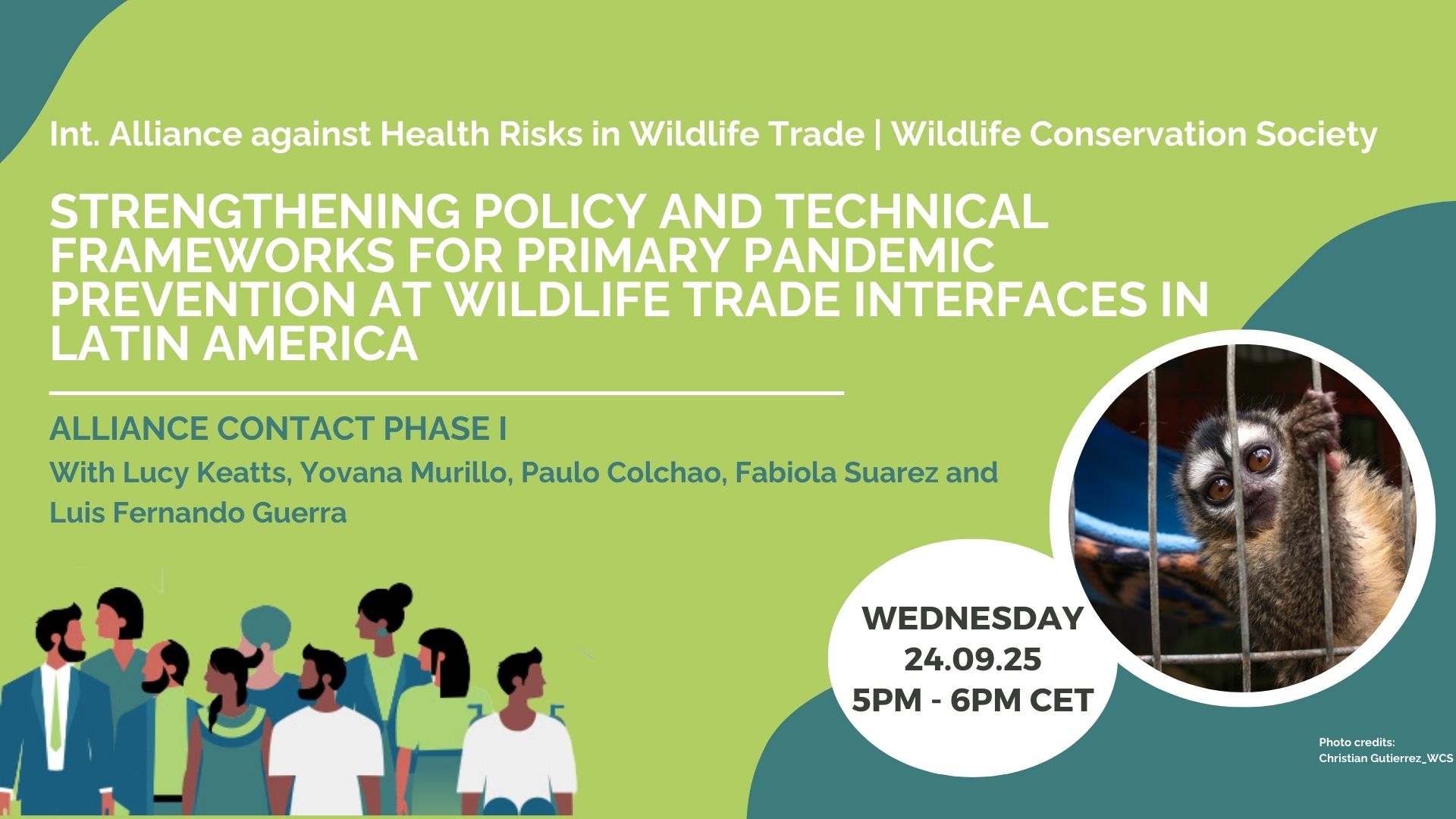
Dear Alliance members and colleagues,
we warmly invite you to the Alliance’s next event with the Wildlife Conservation Society (WCS) presenting the results of the three CONTACT missions in Peru, Bolivia, and Guatemala on September 24, 2025.
The most cost-effective and sustainable way to affect long-term risk reduction for spillover and spread of zoonotic pathogens via poaching and wildlife trade is through policy change, strengthening of legislation, and identifying innovative ways to ensure the successful application and enforcement of the law. In many countries, adequate data and analysis are lacking to inform detailed characterization of wildlife trade chains, drivers, risky behaviors, and critical control points. This limits evidence-driven policy frameworks and legislative approaches for targeted, locally relevant risk reduction.
Three high-biodiversity countries with large volumes of wildlife trade and government commitment interest in reducing health threats from such trade were selected for this initial CONTACT consultation approach: Bolivia, Peru and Guatemala. The Wildlife Conservation Society (WCS) worked closely with multisectoral government agency partners to expand understanding of wildlife trade dynamics, critical control points, and gaps for risk reduction of pathogen emergence along wildlife trade chains, and inform policy revisions and recommendations that strengthen primary pandemic prevention in the three countries.
Agenda
Introduction: Lucy Keatts
Multi-country approach, consultative framework and results of needs analysis: Yovana Murillo
Key successes, challenges and lessons learned from each country
Bolivia: Fabiola Suarez
Guatemala: Luis Fernando Guerra
Peru: Paulo Colchao
Co-benefits of CONTACT approach in the region and next steps: Lucy Keatts and Yovana Murillo
Questions and discussion
About the speakers

Lucy Keatts is a veterinarian with a masters in Conservation Medicine from the University of Edinburgh and two decades of experience working on projects related to wildlife health, wildlife trade and emerging infectious diseases. She is Associate Director of the Wildlife Conservation Society (WCS) Health Program, supporting the implementation of One Health approaches for research, surveillance, disease prevention and risk reduction at environment/wildlife-human interfaces around the world that promote ecosystem, animal and public health.

Yovana Murillo is a Peruvian veterinarian with over 15 years of experience on counter wildlife trafficking in South America. She has a master’s degree in management and conservation of species in Trade and a diploma in wildlife management and conservation. In 2012, she joined WCS’ Health Program team, leading the wildlife health and trafficking initiative in Peru, and, since 2019, has served as regional Counter Wildlife Tracking programme manager for the Andes, Amazon and Orinoco region. She is a member of the Global Initiative Against Transnational Organised Crime (GI-TOC) and the International Alliance Against Health Risks in Wildlife Trade, and is a founding member of the Association of Wildlife Veterinarians in Peru (AMVEFAP).

Paulo Colchao is a veterinarian graduated from the Universidad Peruana Cayetano Heredia, with a master’s degree in Wild Animal Health from the Royal Veterinary College, University of London. With over 13 years of experience working on research, conservation, and health projects for free-ranging wild animals, he currently serves as Wildlife Health Specialist for WCS in Peru. He has been promoting wildlife health management under the One Health approach in Peru through wildlife health surveillance, outbreak response, reduction of risks associated with wildlife trade, and multisectoral collaboration.

Fabiola Suarez is a veterinarian with a master’s degree in Ecology and Conservation, a diploma in Neotropical Wildlife Medicine, and a specialization in Avian and Reptile Medicine. With more than 13 years of experience in wildlife health and the One Health approach, she has led projects on the prevention of zoonotic diseases, including the development of the Biosecurity Guidelines for Zoos and several technical documents and protocols to mitigate zoonotic risks, as well as studies on health risks associated with the illegal wildlife trade. She served as the National Biodiversity Management Officer at the Ministry of Environment and Water of Bolivia and currently conducts analyses of zoonotic risks. She is a member of the Wildlife Disease Association, the International Alliance against Health Risks in Wildlife Trade, and co-founder of the Bolivian Association for Wildlife Health.

Luis Fernando Guerra is a veterinarian with a master’s degree in Wildlife Conservation and Management (UNA, Costa Rica). Since 2018, he has coordinated the regional health agenda for Mesoamerica at the Wildlife Conservation Society (WCS). His work focuses on conservation, community health, and zoonotic disease surveillance under the One Health approach, promoting inter-institutional collaboration in Guatemala. He has served on the Board of Directors of the Wildlife Disease Association (Latin American Section), and his experience integrates health, conservation, and evidence-based multisectoral strategies.